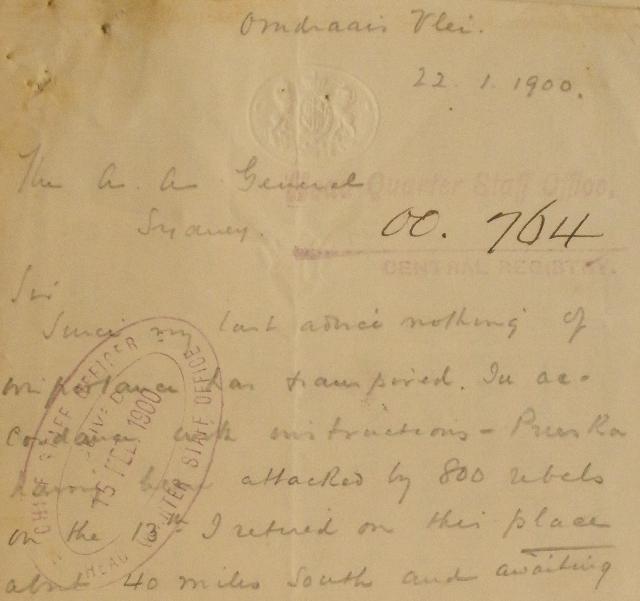Topic: BW - NSW - NSWMR_A
A Sqn NSWMR
"A" Squadron, NSW Mounted Rifles

Antill Letter, 8 February 1900
The following transcript is of a letter written by Captain John Macquarie Antill, Officer Commanding the New South Wales Mounted Rifles contingent to South Africa to the New South Wales Chief Staff Officer and Assistant Adjutant General Colonel Henry Douglas Mackenzie.
From Captain Antill
Commanding New South Wales Mounted Rifles
To the Assistant Adjutant General
New South Wales Forces
Ramah (12 miles East Orange River Station)
8 February 1900
Sir
My last advice to you was from Houwater from which place I returned to Prieska on January 27th with a mounted column under Colonel Alderman command from De Aar consisting of the 20th Battery Royal Horse Artillery, 2 Companies (The Eastern and York) Mounted Infantry 2 companies South African (now changed to "Roberts Horse") Horse and 1 mounted section machine guns. The large number of the enemy which occupied the town on my departure we found had recrossed the river which had suddenly risen and the place was found empty. The column again left Priesker for Orange River by route march on January 30th at 2 am a distance of 100 miles where it arrived on February 2nd. The major part of it proceeded to Modder on the 4th and my Squadron to Ramah a post 12 miles east on the Orange River, having the Queensland Mounted Infantry 7 miles north west at Reit Fontein and the 14th Hussars (1 Squadron) and two 15 pounders at the drift at Zoutpaier 7 miles further east. These three posts to clear the vicinity of the enemy and guard against the advance of the enemy who are supposed to be occupying several strong laagers on our front.
On the 6th I made a reconnaissance to a cluster of Copjies 10 miles north east east of Ramah across a large plain and there surprised a small outpost of 12 Boers who retired precipitously on our approach to a laager which was very strongly occupied about 1 mile further east: was unable to get within range although shots were exchanged at long range with what result is no known on their side. Our casualties nil. Burned the post and two large houses belonging to the enemy and took 42 horses and 12 cattle, returning to camp after a long day of 12 hours. These horses of which 20 were suitable were mostly good sorts and I am now engaged in breaking them to fill casualties in the way of sick and unfit. The General Officer Commanding Orange River yesterday informed me by messenger that he is very pleased with the result of the reconnaissance. It is very difficult to secure prisoners. The Boers imbeds in very strong positions with good cover retire very quickly from Copje to Copje and with the small force under my command, it is unsafe to follow unless the country here is fairly open. Most of the Squadrons and Companies have Maxims or one or two guns to assist and find these adjuncts very useful. Am therefore at a disadvantage in this respect. I anticipate being left here for a week or so and then moved to the front at Modder. Our Colonial horses cut up a good deal as previously reported on the very rough country and those taken from the Boers though small are admittedly adapted to this work.
One of my men (Waterson) has contracted enteric which is very prevalent just now and in hospital in Cape Town there are also 5 other men in hospital chiefly slight attacks of fever and one sunstroke but nothing serious.
The discipline of the unit is everything which can be desired and in my opinion, from observation, is far before that of others than Colonial troops. As a case in point en route Colonel Alderson placed the towns in which liquor could be procured, out of bounds to the remainder of the column: allowing me to use my own discretion: I have had no trouble at all: And this officer on more than one occasion complemented the unit on its exemplary conduct and on the manner in which the field duties were carried out: Infantry seem of little use and are not used except in occupying fixed positions and the Imperial Mounted Infantry appear to be not used to the bush work. Occasionally one comes a man or 2 who has lost himself quite close to his own Troop: Our clothing is mostly in rags, and it is difficult to procure any out of stores there being, with unexpected demand a great drain upon all stores: We have had lots of fresh meat from the looted stock and as the Imperial ration is small have done well: The horses however cannot do on the scale and I have had to ask for additional. All that is allowed is 6lb mealies 6lb chaff (straw). Mules can do on this also country horses but our larger horses must have 50% more to work upon.
The sick are:
Sergeant Gilfillan - Sun (slight)Private McGregor - EpilepticPrivate Waterson - EntericPrivate Maples - Fever (slight)Corporal Bateup - Dysentery
Your obedient servant
JM Antill, Captain
Commanding Mounted Rifles Unit.
Previous: Antill Letter, 22 January 1900
Next: Antill Letter, 22 March 1900
War Diaries and Letters
All War Diaries and letters cited on this site should be read in conjunction with the Australian Light Horse Studies Centre, War Diaries and Letters, Site Transcription Policy which may be accessed at:
Australian Light Horse Studies Centre, War Diaries and Letters, Site Transcription Policy
Further Reading:
New South Wales Mounted Rifles, "A" Squadron
New South Wales Mounted Rifles, "A" Squadron, Roll of Honour
Battles where Australians fought, 1899-1920
Citation: "A" Squadron, NSW Mounted Rifles, Antill Letter, 8 February 1900



